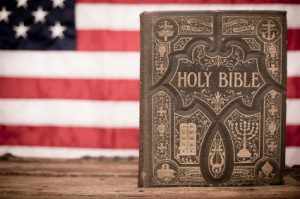 As an evangelical theologian, I can’t wait for Christian America to die. Why? I have at least three reasons.
As an evangelical theologian, I can’t wait for Christian America to die. Why? I have at least three reasons.
First, Christian America wasn’t/isn’t Christian enough. I once heard Dr. John M. Perkins (the famed evangelical Christian African American civil rights prophet) say in response to the claim of many evangelicals that we need to go back to the religion and ways of the founding fathers: “I don’t want to go back there: I’d still be a slave.” No doubt, many or most all white conservative Christians today who long to go back wouldn’t tolerate slavery as it was practiced then again. But it is still disconcerting that they aren’t thinking of slavery either when they hearken back to that founding era. Their level of comfort with a preceding era generates a sense of nostalgia. I heard a noted white evangelical preacher lament a few years ago that our country is getting progressively worse. As I said in response to this fear in my recent blog post, “The Elections, End Times and the Elect,” “If this is so, why then do many African Americans, Hispanics and women feel our country is getting better? I can’t help but think if our perceptions on whether things are getting better or worse are often bound up with how much we think our special interests are taken to heart and how large or small our own voting bloc is.” All too often, the passion to protect and preserve and promote “Christian America” is about going back to a previous age in America which we often do not realize is bound up with a social contract established by deist and slave-owning Thomas Jefferson and his associates (some were Christians, some were not). What we really ought to seek after is to live into God’s eschatological future framed by the history of God’s covenantal act in Jesus. As liberating as our nation’s ideals are, they pale in comparison to the liberating love of Jesus that sets all captives free (See Luke 4:14-20).
Second, Christian America isn’t free enough. When we Christians claim that we have squatters’ rights—that we were here first, and that the government owes us certain Christian entitlements, we end up enslaved. As Karl Barth said, “Whenever the Church has entered the political arena to fight for its claim to be given public recognition, it has always been a Church which has failed to understand the special purpose of the State, an impenitent, spiritually unfree Church” (“The Christian Community and the Civil Community,” in Against the Stream: Shorter Post-War Writings,1946-1952, ed. R. G. Smith, trans. E.M. Delecour and S. Godman {London: SCM Press, Ltd., 1954}, 31). With Barth’s view, the church has the freedom to proclaim the good news of Jesus; whether or not the state gives the church special recognition, nothing can take away from this freedom. In fact, special recognition can take away from that freedom, for such freedom often if not always comes with political strings attached. Paul proclaimed the gospel, even while in chains in Rome. Nothing could stop him. Paul said himself, “Remember Jesus Christ, raised from the dead, descended from David. This is my gospel, for which I am suffering even to the point of being chained like a criminal. But God’s word is not chained” (2 Timothy 2:8-9).
Third, Christian America isn’t gospel-centric enough. The other day I spoke to a group of Christian college students about the need to be discerning, humble and relational Christian witnesses in an increasingly multi-faith society. A young man lamented afterward to me that our country is divesting itself of all the Christian capital we had gained and that objective truth is waning. Whether or not he is right about objective truth waning as our country becomes increasingly pluralistic, our increasing pluralism as a nation allows for us to move beyond the false presumption that everyone is Christian. In the Bible Belt, so many who are not Christians, except perhaps in name only, presume that they are Christians because of the prevailing culture. It is so hard to share the good news of Jesus with those who presume they are Christian because everyone is born a Christian where they come from: they often think—why should one share with them, since they are already believers? The further we move toward a post-Christian society, the closer we will come to having open, honest, face-to-face encounters with people who know they are not Christians, as Paul did in Athens, including his engagement at Mars Hill (Acts 17:16-34). Such open and honest face-to-face encounters make it possible for us to be all the more gospel-centric in our sharing because the gospel is not seemingly diluted by cultural trappings.
Sure I have fears that keep me longing to have certain special privileges as a Christian in America. But at what cost to the gospel do those supposed privileges come? My fears trap me and enslave me and keep me from sharing the good news of God’s liberating love. Fears over such things as losing one’s tax exempt status or that Christians might someday be imprisoned for sharing their faith in America may be realistic or far-fetched. Either way, such fears enslave. But no matter what, the gospel can never be enslaved. Don’t get trapped into thinking that Christian America will help us Christians bear witness to the good news of Jesus. What Barth called “the emancipation of the world from the church” will lead to the emancipation of the true gospel to be emancipated from slavery to American culture and be proclaimed to one’s fellow Americans free of charge. (For Barth’s discussion of the freedom for gospel witness that occurred with the dissolution of the marriage of the church and state in Europe, see Karl Barth, Church Dogmatics, IV/3.1, The Doctrine of Reconciliation {Edinburgh: T. & T. Clark, 1961}, pp. 20-21).












